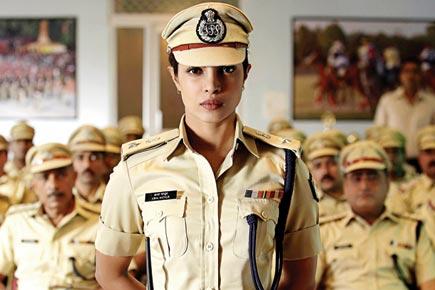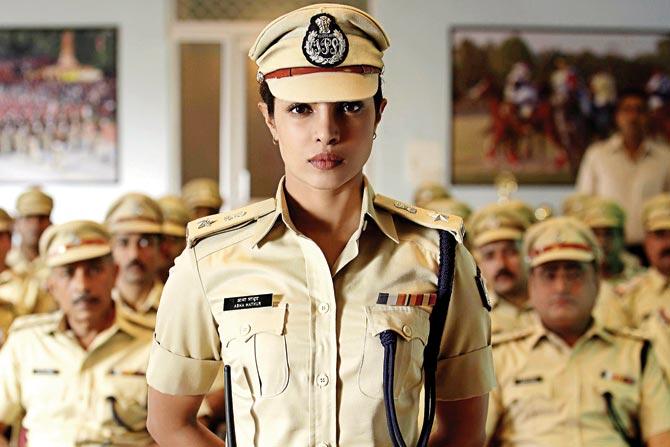Bollywood has survived post-Valentine gloop with two films portraying women as made of sterner stuff than men -Ram Madhvani's Neerja and Prakash Jha's Jai Gangaajal.

 Bollywood has survived post-Valentine gloop with two films portraying women as made of sterner stuff than men -Ram Madhvani's Neerja and Prakash Jha's Jai Gangaajal. Neerja had Sonam Kapoor play Neerja Bhanot, based on the true story of the 23-year-old airhostess, who lost her life helping passengers escape the hijacked Pan Am flight in 1986 - and left most audiences moist-eyed.
Bollywood has survived post-Valentine gloop with two films portraying women as made of sterner stuff than men -Ram Madhvani's Neerja and Prakash Jha's Jai Gangaajal. Neerja had Sonam Kapoor play Neerja Bhanot, based on the true story of the 23-year-old airhostess, who lost her life helping passengers escape the hijacked Pan Am flight in 1986 - and left most audiences moist-eyed.

Priyanka Chopra in a still from Jai Gangaajal
In Jai Gangaajal, Priyanka Chopra plays SP Abha Mathur, an upright police officer, who almost single-handedly fights a corrupt nexus of politicians, police and land mafia in Lakhisarai, Bihar. The film proposes that it takes a woman to set things right. While this is not new, and mainly a 'realistic fantasy,' in mostly regressive Bollywood, it is still worth applauding. When Ms Mathur despatches a bunch of goons with just her lathi, a junior male police officer says, "Madam Sir, you have made men of us today." But, being a man is not enough in Ms Mathur's book; you need a woman to bring justice. Less macho is more. When corrupt-cop-turned-good guy BN Singh (Prakash Jha) is about to deliver vigilante justice by hanging the wicked MLA Babloo Pandey, Ms Mathur insists that only the courts can bring justice. The trouble is, Ms Mathur is ever-Oscar-ready, grinding assorted baddies in the dust, with never a hair out of place.
Meanwhile, it is worth observing women's portrayals in Indian media, film and television. Of course, Indira Gandhi, Sonia Gandhi, Mayawati, Jayalalitha and Mamata Banerjee, have all shown that ambition, decisiveness and Machiavellian skillsets are crucial for political longevity. As for television, Kavita Chaudhary's Udaan (1989), in which another woman police officer fought for justice, has fast-forwarded 26 years on, to Ekta Kapoor's top-rated Naagin, in which women are the new costume for ichchadhari nagins - wish-fulfilling snakes.
No wonder, actress Geena Davis recently told The Guardian, "The more TV a girl watches, the fewer options she thinks she has in life." Davis, who starred in the cult feminist film Thelma and Louise, subsequently founded the Geena Davis Institute on Gender in Media, to encourage more and worthwhile roles for women in the media. "If we see women doing brave things, it impacts us greatly," she said, admitting that very little had changed in 25 years. In fact, as a forerunner to International Women's Day on March 8, I had curated a package of Asian films for the FLO Film Festival and symposium in Mumbai last month, held in collaboration with the Geena Davis Institute, with films that questioned patriarchy and showed women empowered in a variety of ways.
It is heartening that younger generation directors, in both mainstream and regional Indian cinemas, are paying close attention to women's roles. Recent Bollywood has given us the explosive NH10, in which Anushka Sharma herself turns killer, in order to save herself from goons. Bajirao Mastani toplined a Muslim woman warrior, who becomes the second wife of Hindu Peshwa Bajirao I. The Pinga dance featuring wife Kashibai and mistress Mastani looks gorgeous, but is a feminist thumbs down; yet, Kashibai has her husband save Mastani from attacking rebels. The delicious Dum Laga Ke Haisha had an overweight woman charm her groucho husband; but in fact, his unemployed family seeks a working bride as a phookat source of income. And few films can beat Piku for the delightful ordinariness of the superwoman, juggling her job, housework, caring for an ageing dad, and bits of a love life. Beyond Bollywood, Masaan famously enabled an educated woman to escape a small town's sleazy, corrupt clutches.
In recent regional cinema too, Nagraj Manjule's forthcoming Sairat (Wild, Marathi), as we have written before, is a compelling love story across the caste divide, with a rural teenage girl protagonist who is feistier than most Bollywood heroines. She rides an Enfield Bullet, goes all out to get her guy, and even gets him released from the police thana. Gajendra Ahire's The Silence has a young woman file an FIR against a paedophile, while another puts an end to domestic abuse. Churni Ganguly's Nirbashito (Banished, Bengali), on a courageous woman writer in exile, was inspired by banned writer Taslima Nasreen. In Girish Kasaravalli's Thai Saheba (Kannada), an older film, the wife not only bonds with the mistress, they even allow their children to marry. And, in Jeethu Joseph's Drishyam (Malayalam), a young girl being molested, fiercely attacks and accidentally kills her molester.
Finally, Piku beautifully illustrates what a friend once told me: Love is the cherry on the cake. But you've got to be the cake yourself. Attagirl!
Meenakshi Shedde is South Asia Consultant to the Berlin Film Festival, award-winning critic, curator to festivals worldwide and journalist. Reach her at meenakshishedde@gmail.com.
 Subscribe today by clicking the link and stay updated with the latest news!" Click here!
Subscribe today by clicking the link and stay updated with the latest news!" Click here!







